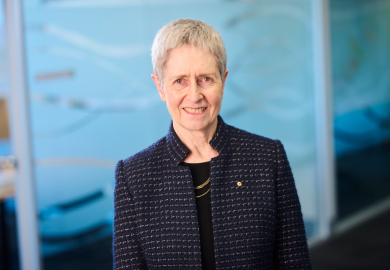At times of international upheaval, Western universities must redouble efforts to tackle global problems. We must also build ways to work with partners in nations that do not conform to Western norms and values, while protecting our own principles and standards.
This is not a time to retreat into national pockets of academia but instead to turn our attention to what we do best: seeking solutions to intractable problems by working with partners around the globe.
The scale of the tasks ahead, whether tackling climate change or battling pandemics, requires a level of political commitment and targeted research never previously experienced. Put simply, there is no alternative to international cooperation if we are serious about conquering these challenges.
The mission of the University of Cambridge is “to contribute to society through the pursuit of education, learning and research at the highest levels of international excellence”. It is in pursuit of this mission that every year we step up our international engagement.
But we must do so with eyes wide open to an expanding and increasingly complex series of potential risks. These fall into five broad categories: the safety of students and staff; threats to academic freedom; theft of intellectual property for “dual use” – possibly military – purposes; dependence on funding for research; and a final wider challenge of working with partners having different political, social and cultural values from our own.
In response, we at Cambridge have agreed a new set of principles that will underpin all aspects of our international engagement and research. Followed carefully, they will help our academics avoid collaborations that pose a threat to security or academic freedom while giving them the confidence and support to work with the broadest set of international partners, ensuring world-leading impact.
We are focusing on practical help to students and staff to improve their understanding of potential dangers – providing ready access to advice on ethical, reputational or security concerns. We will also be reviewing all our international agreements to check that they specifically protect the freedom of our academics to prosecute their research to greatest effect, even where there is potential for stirring controversy.
Separately, we will be raising awareness of possible intellectual property theft to mitigate the risk of hostile use of security-sensitive data or technology. Existing procedures to promote due diligence in forming international partnerships will be brought together and strengthened to guarantee openness in research. Just as importantly, we will reinforce our current processes for scrutiny of funding sources to make sure that we maintain our strong institutional autonomy.
All of this work has been framed against the dramatic changes in China’s relationship with the world over the past decade. The “golden era” of Sino-British relations proclaimed by former UK prime minister David Cameron looks very different five years on, when we in the West are challenged by China’s imposition of the national security law in Hong Kong, continued repression of minorities and sabre-rattling in the South China Sea.
As someone with an academic background in international law and human rights, I do not minimise those issues and, of course, feel abhorrence at all unjust incarceration, deprivation of rights or torture, wherever committed. Regrettably, these practices are not new and they happen across the globe. Cambridge has researchers involved in high-impact projects based in 120 countries throughout Africa, Asia, South America, Europe and the Middle East. Many of these are in places that do not share Western values, yet the research in areas such as public health or the conservation of nature could have massive benefits to humankind.
For example, we are one of a number of UK universities (including the University of Oxford and King’s College London) collaborating with the Centre for Cognitive Neuroscience at Fudan University, China, to look at the biology underpinning how our brains function. This knowledge will help us understand – and treat – major neurological and psychiatric disorders.
In Uganda, where maternal death rates can be 50 times higher than in high-income countries, Cambridge researchers are collaborating with colleagues at Makerere University to better understand the life-threatening condition pre-eclampsia, which causes high blood pressure during pregnancy and after labour. Working in one of the busiest maternity hospitals in the world, they have already identified genes only found in women of African descent linked to risk of and protection from pre-eclampsia. The team are now developing the first contemporary textbook of obstetrics written by African doctors for African women.
I believe, along with most of my colleagues, that values are upheld – and changes happen – through engagement, not by insulating ourselves from difficult circumstances. This is incidentally also UK foreign policy. In its recent Integrated Review of Security, Defence, Development and Foreign Policy, the government stated its intention to “develop a better understanding of China and its people”, in light of China’s “growing impact on aspects of our lives” and of “systemic challenges” that it poses.
The new international engagement principles we have developed at Cambridge will allow us to continue to work on vital research with partners across the world, taking careful regard of risks. They should give us the confidence to engage with China and other countries on our terms. Universities cannot and should not ignore geopolitical tensions, but we cannot be isolated by them.
Stephen J. Toope is vice-chancellor of the University of Cambridge.
Register to continue
Why register?
- Registration is free and only takes a moment
- Once registered, you can read 3 articles a month
- Sign up for our newsletter
Subscribe
Or subscribe for unlimited access to:
- Unlimited access to news, views, insights & reviews
- Digital editions
- Digital access to THE’s university and college rankings analysis
Already registered or a current subscriber?








